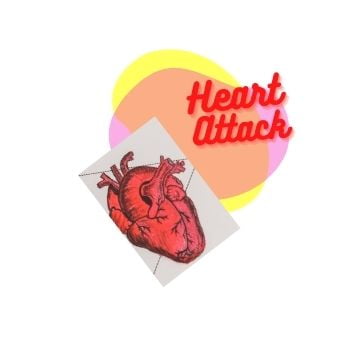Learn to prevent a heart attack and have a healthy heart
Introduction
Any heart disease is a very significant health event in our lives that can be very critical and learning how to prevent heart attack is equally important for our survival.
Has anybody among you ever experienced a heart attack or a stroke? When we are younger and carefree, we barely bother about having a heart attack, let alone preventing it.
But as we grow older and our responsibilities grow, we start thinking seriously about our health and how certain conditions can be prevented. We start developing some chronic diseases like hypertension, diabetes, arthritis, and these conditions can lead to a heart attack.
Why have I mentioned a Stroke in the above question?
Because the cause of Stroke is cardiovascular, meaning diseases that can cause a heart attack like hypertension, diabetes, high cholesterol levels can also cause a stroke.
We celebrate 30th September as World Heart Day. On this occasion, Cardiologists [Heart Specialist] from all over the world come out with many articles on Heart health.
As a General Medical Practitioner, I have also decided to share some knowledge on Heart health and talk about the Prevention of a heart attack. I am sure that knowing this can help you add valuable years to your life.
In one of my previous articles, I had written about the different causes of chest pain. A heart attack was one of them.
In this article, I am going to elaborate on heart attacks with the help of examples. I will also cover salient points to look out for in an impending heart attack.
Knowing this will help you in preventing this condition, especially if you are a young or middle-aged person.
Who are the people to get an early heart attack?
Before we go ahead, you would surely like to know- who are the people most likely to get a heart attack earlier than others? Well, you can get a heart attack earlier in life if you are-
- Highly overweight or Obese
- Diabetic
- Hypertensive
- Sedentary or relatively inactive
- Postmenopausal if you are a woman
- Having another hormonal disease like hypothyroidism, Cushing’s disease, etc.
Having said this, these above conditions remain the crux of prevention of a heart attack because they are preventable.
So, let us begin-
Heart attack-
What exactly is a heart attack? And what is heart failure? Both conditions are related to a common condition- popularly referred to as heart disease.
A heart attack occurs when the blood supply to the heart muscle is cut off due to blockage of arteries of the heart- the Coronary arteries. That’s why it is referred to as CAD [coronary artery disease].
This causes severe chest pain and discomfort to the patient [I will come to it eventually].
The heart muscle may-
- Recieve less blood supply and oxygen. This is called Ischaemia.
- Die due to the total lack of blood supply. This is called Myocardial Infarction.
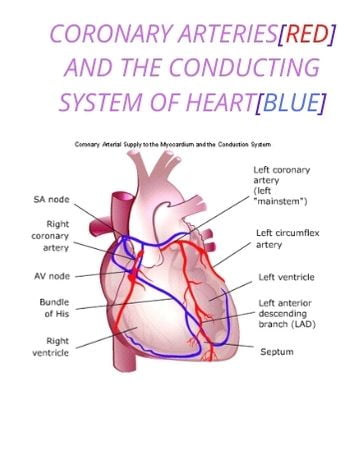
To understand this, let us see how the heart gets its blood supply. The picture shown below shows the blood vessels that supply the heart with blood-
In this picture, you can see the distribution of the Coronary arteries that supply the heart [red colored]. It also shows the system that actually conducts the impulse from one part of the heart to the other [blue colored].
The Coronary Arteries-
The coronary arteries that supply the heart come directly from the main artery-the Aorta [inverted ‘C’ shaped large artery]. The different coronary arteries that are described in a coronary angiogram are named as follows-
A] The Left Main artery-
This supplies the left side of the heart. It branches as-
- The Left Anterior Descending branch [LAD]-that supplies the lower left side of the heart-the left ventricle. It is the most common cause of a heart attack.
- The Left Circumflex artery-this supplies the left upper part of the heart-the left atrium.
B] The Right Coronary Artery-
This artery supplies both upper and lower parts of the heart i.e. the right atrium and right ventricle.
The Conducting System of the heart-
Why am I mentioning this? These are nerve-like fibers [shown in blue color in the picture] that conduct impulses from one part of the heart to another, starting from the SA-Sinoatrial node. Therefore, in a heart attack when the blood supply to the heart gets disrupted, these fibers also get affected causing the heart to ‘wobble’, meaning beating irregularly- a condition often referred to as ‘Arrhythmia’.
What happens in a heart attack?
Have look at the picture below-

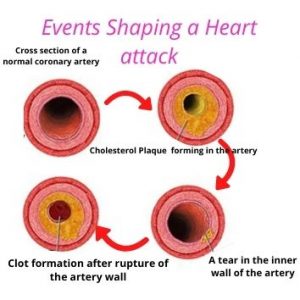
This picture shows a man clutching his chest due to pain caused by a lack of blood supply to the heart. The inset shows the blockage of the heart artery [the coronary artery]’. Here is how it occurs-have a look at the picture shown below-
This picture shows-
- Initially how a normal coronary artery looks like.
- The build-up of fats or cholesterol in the inner layer of the artery is called the plaque, initially causing narrowing.
- As the layer of plaque increases, there is rupture of the innermost layer, leading to-
- A clot or thrombus formation in the lumen of the artery.
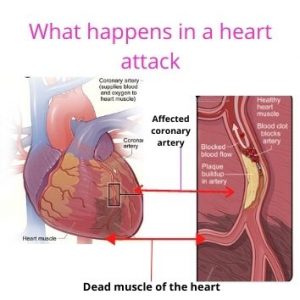
This clot obstructs the flow of blood to the muscles of the heart causing it to cry out for oxygen presented as pain called Angina if there is a partial block. If there is a total block, it causes the death of the heart muscle called Myocardial Infarction. [See the picture below]
What exactly happens in a heart attack?
Kindly watch this video to know how exactly an heart attack occurs-
What then is Heart Failure?
It is a condition in which the heart becomes weak and is not able to function properly. This can happen due to-
- A previous heart attack that has damaged the heart muscle.
- Anemia- lack of hemoglobin-the oxygen-carrying pigment in the blood.
- Beriberi- a type of vitamin deficiency caused due to lack of Vitamin B1[Thiamine] in the food we eat.
As you see, heart failure can happen post-heart attack.
To know the symptoms and signs of heart failure, Click Here.
What is Cardiac arrest?
Very often we hear that someone got a cardiac arrest. What does that mean? Simply put, cardiac arrest occurs when the heart stops beating.
Prolonged cardiac arrest can lead to serious problems. Our brain needs a continuous flow of blood supply to keep functioning.
Similarly, our kidney also needs a continuous blood supply to carry out the filtration of impurities like urea, creatinine, etc., from the blood. If the heart stops there is a disruption of these functions.
If the brain does not receive blood supply within 3 minutes of the cardiac arrest, there can be brain death, even though your heart might be beating after reviving it.
How are heart attacks and cardiac arrest related?
Let me explain this with an example. A few years ago, one of my colleagues, suffered from cardiac arrest while he was asleep at night, at around 2.00 a.m.
He suddenly fell from his bed and the thud of his falling woke up his wife. She immediately came to his side and checked his pulse at the wrist and neck. They were absent.
Being a doctor’s wife, she sensed that her husband probably had a cardiac arrest. She immediately thumped the left side of the chest-the part where the heart is located in most cases. The heart started beating immediately and the doctor recovered.
He was then taken to a hospital nearby. The cardiologist on duty did an angiogram. It was found that there were 2 blocks in his coronary arteries. His cholesterol levels were also found to be very high.
Later, after 2 stents were put in his blocked coronaries and discharged with these instructions-
- Reduce weight- he was very chubby and enjoyed eating high cholesterol-containing foods like fried delicacies.
- Take statins – a medicine to reduce cholesterol [more on this later].
- Regular exercise.
After a few weeks, this chubby friend of mine had lost almost 10 kgs and his heart is doing fine to-date.
Now let us revert to our main topic-the Heart Attack. Before we go on to prevent it, let us understand how it is caused.
Causes of Heart Attack – know how to prevent it-
Knowing the causes of heart attack is the key to its prevention. What then, are common causes of a heart attack? I have here a small but important list along with ways to prevent a heart attack-
1. Stopping Cigarette smoking/ tobacco chewing can prevent heart attack –
This is by far the most common as well as the dangerous cause of having a heart attack. Why? Because tobacco smoke is known to contain about seven thousand chemicals that are harmful to our body. The most prominent among them is Nicotine– a chemical that is addictive as well as a brain stimulant.
Unlike caffeine and tannin, which are chemicals that are present in coffee and tea, which are also stimulants, nicotine can cause the hardening of our blood vessels by coating the inner lining of the arteries. A narrowing of arteries and its hardening can raise blood pressure and also limit the blood supply to the heart by the coronary arteries.
Prevention-
Stop smoking- as simple as that. But for a person who has been smoking for ages, this is near impossible but not doable. I recommend using these things to reduce and stop smoking and chewing tobacco-
a] Use a nicotine patch as shown below-
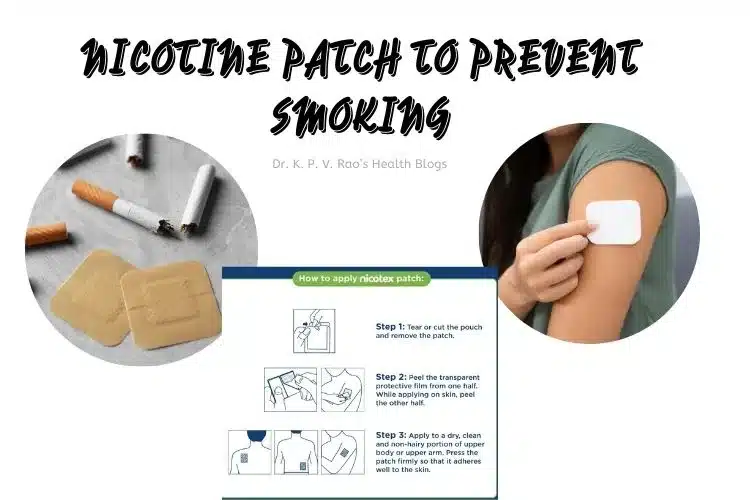
b] Use nicotine lozenges as shown below-
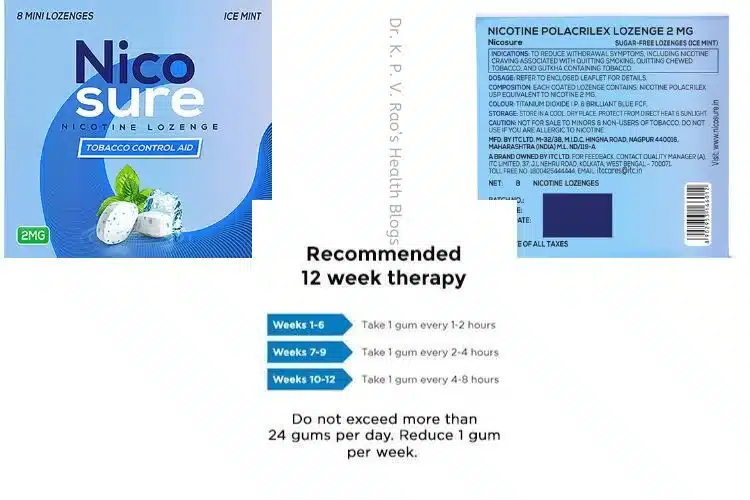
2. Overweight or obese condition-
What is your present weight? You can be having anything one of these variations-
- Having an ideal body weight [IBW]- you can calculate it here-;
- Slightly overweight- about 5 to 10% above your IBW
- Overtly overweight- above 10% but less than 30% of your IBW
- Obese- more than 30% of your IBW
Here I would like to say one thing- the more your body weight above the IBW, the more the strain on your heart. This can lead to-
- High blood pressure.
- Breathlessness.
- High cholesterol levels.
- Plaque building in your coronary arteries- this is what is causing the breathlessness.
So, what should we do?
I suggest that you should first check your BMI. If your BMI is above 25 or in between 25 to 35, then you should do this to prevent getting a heart attack-
A] Start a regular exercise routine.
You can start slow and build upon a routine doing more after a few days. Which would be the best exercise? I recommend that you start by going for regular walks- say, for about 30 minutes brisk walking initially. Stretch it to 60 to 70 minutes as you become more and more used to it. You can purchase a good fitness band or a multi-million purpose gadget like the one shown below-
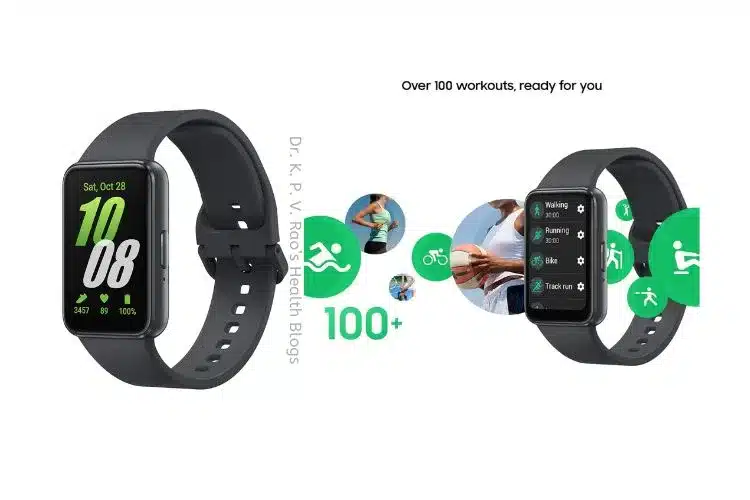
Using this device can motivate you to do more exercise, reduce weight, and help in improving your heart health.
How much exactly should you exercise-
Here I am reminded of what my younger brother, a brilliant physician practicing in Pune, told me while we had gone to play cricket.
As I started my run-up to bowl at him, he just said casually-“Don’t run too hard- remember we at an age when we can get an Infarct“. What did he mean by this?
The question per se indicates our age-I was in my 50s and he was in his 40s. Remember, that as we age our heart also ages, and we are at risk of having a heart attack if we suddenly exert ourselves after a gap of many years. Neither of us had played cricket for quite some time.
So the idea is to exercise as much as our body allows us to. Meaning, start slowly and build your tempo as the days go by. This way you will realize how much you can pump up your heart without putting much strain on it. An article which I read recently will tell you how much you should do-Link
B] Diet-
What exactly is a good diet to prevent heart attacks? A balanced one. Your healthy diet should have these ingredients in a proper ratio as shown below-
- Carbohydrates– 40 to 60%.
- Proteins– 25 to 35%.
- Fats– 15 to 20%
So, the balanced diet should be roughly in the ratio of 3:2:1 starting with carbohydrates. You can re-visit the links above to get a better insight. Recently I read an article which recommends Tofu in our diet to prevent heart attacks.
Tofu contains chemicals called isoflavones that are known to help reduce cholesterol. Like this, there are many ingredients such as nuts, healthy edible oils, etc., that can contribute to our heart health.
Here again, I would like to interrupt you and listen to this podcast-from Harvard Medical Education .
3. Diabetes and Cholesterol levels-
” What we eat is what we become”. This statement is particularly true when we co-relate diabetes with heart disease. This correlation is called Cardiometabolic disease or CMD in short.
Long-standing diabetes can cause damage to the blood vessels in our body, including that of the heart. These are termed Microvascular and Macrovascular changes.
Microvascular changes damage smaller or tiny blood vessels eg. like that of the eyes, brain, kidneys, etc.
Macrovascular changes damage larger blood vessels like that of legs, heart[the coronaries], etc, leading to the creation of blocks or clots when it is associated with high cholesterol levels. This then becomes the primary cause of a heart attack.
How then do we prevent a heart attack in Diabetes?
You can prevent heart attack even if you are a diabetic. Tight control of blood sugar levels can do the trick. If you have diabetes, self-monitoring of blood sugar at home using a good glucometer[shown below] can help you do this.

Similarly, I would advise you to get your HbA1c done every 3 months and see that it remains under 6. This will again help you prevent a heart attack. As a part of the treatment, along with medications, a proper diet can also help you to control blood sugar levels. You can read this article about some dietary recommendations here- Link
Most diabetics suffer from a condition called Silent Myocardial Infarction or SMI. It is nothing but a silent heart attack. The patients may not feel the chest pain which is typical of a heart attack. I remember a patient of mine whose diabetes was not well controlled and that he died in his sleep-he had suffered a massive heart attack and did not know it. He was barely 52 years of age.
4] Stress and Strain
What exactly do we mean by stress and strain? Anything that causes anxiety is stress. When we exert ourselves beyond the limit, that is a strain.
How do these two things lead to a heart attack? Research shows that when we are anxious and that too persistently, our body releases two hormones- Cortisol and Epinephrine. These are the chemicals that have a bad effect on almost all parts of the body and that includes the heart too. How it does that is beyond the scope of this article, but we do know how to overcome it. This article published by Harvard Medical publication in July 2020 will help you in controlling stress- read here.
Persistent stress also raises our blood pressure which adds an extra load on the heart.
What about strain- how does it bring about a heart attack?
As mentioned earlier, we strain if we exert ourselves beyond the limit. Here I would like to explain by these 2 examples-
- Straining while passing stools, especially when constipated, is known to precipitate a heart attack in an elderly person. You must have heard about some elderly person dying while in the toilet- straining is the likely cause. How to prevent this? Take stool softeners and a mild laxative to get rid of constipation.
- Strenuous exercise can also precipitate a heart attack if attention is not paid to the maximum heart rate while doing so. Younger people can withstand some amount of strain, but in the elderly, one should be extra careful.
The rule of thumb while exercising is to set your maximum heart rate limit which is roughly 220 minus your age. If you are 60 years old, your maximum heart rate would be 220- 60=160. This should be strictly adhered to.
You can now calculate your heart attack risk by clicking this link- https://qrisk.org/ and prevent it by following the tips mentioned above.
Conclusion
We have come to the end of this article. Here, I would like to share an interesting and short podcast on the causes of both these conditions. Do listen and try to understand it in a better way. Link-Heart Attack and Stroke
Here is one more article worth reading to get a better knowledge of-Heart attack
You can also prevent a heart attack by avoiding some common mistakes in your life. Here is a related article in that context-Click here
I hope you have enjoyed reading this article which will help you prevent a heart attack as well as add years to your life.
If you have liked this article, please click BELOW to share it-
HOW TO PREVENT HEART ATTACK and add years to your life Share on X
